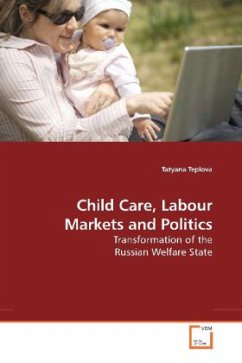This book analyzes child care policies in both Soviet and post-Soviet regimes. The cases studied included child care services, maternity/parental leave provisions, in-home caregiving and other family allowances. The book shows that during the 1990s, Russia has undergone structural reforms of its social, political and economic systems, including deep ideological changes. These changes involved a paradigm shift in the Russian welfare regime toward a neofamilialist model of care, which was seen to fit well with new needs for a flexible work force, while also achieving demographic and political goals. This shift reflects a set of various policy choices and the balance of power within the Russian state, as well as the power resources of external-to-state actors. At the same time, this shift has not facilitated the choice to stay at home with young children, at least for most women. The very tensions within the state that favoured the adoption of a neo-familial paradigm have also limited its ability to implement it effectively. As a result, many women had to try to combine work and family life, albeit under more difficult circumstances than before.







